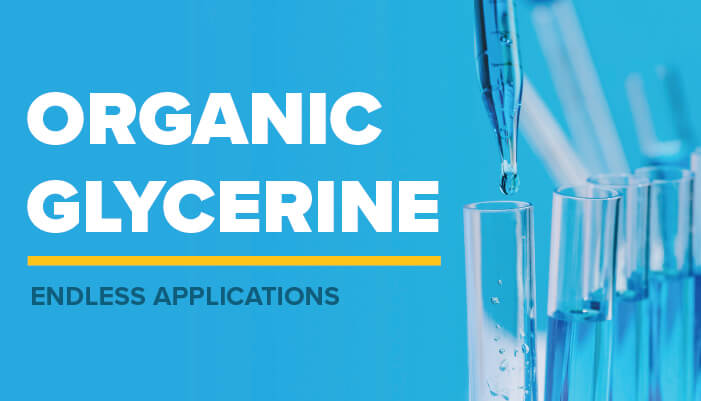The Endless Applications of Organic Glycerine
If you are in the world of food and beverage, organic glycerine should be in your vocabulary due to its countless applications. Glycerine, sometimes spelled glycerin and referred to as glycerol, is a simple polyol and sugar alcohol that functions well as a flavor carrier. Glycerine helps prevent sugar crystallization and adds smoothness and sweetness to many food and beverage products. This versatile ingredient also serves as a humectant, solvent and preservative—its food and beverage-related benefits are seemingly immeasurable.
Its technical versatility is a unique combination of physical and chemical properties. Glycerine readily dissolves in water, making it ideal for water-based formulations. Represented by the chemical formula C3H8O3, its molecular structure is composed of three carbon atoms, eight hydrogen atoms and three oxygen atoms, which allows glycerine to retain moisture well. Glycerine is odorless, colorless and has a high viscosity and boiling point (290 degrees Celsius). Anyone in the world of food and beverage product formulation should consider sourcing this safe, impactful, versatile ingredient sooner rather than later.
Glycerine in the food & beverage industry
Glycerine has seemingly endless applications in numerous industries—primarily the food and beverage industry. Quality organic glycerine should easily absorb concentrated flavorings and distribute them evenly, providing consistent taste in product formulations. Glycerine is used to create and preserve botanical extracts, such as lavender and rosemary extracts. However, it should be noted that, while glycerine and other glycols can render some organic molecules inert, they do not provide broad spectrum protection against mold, bacteria, fungi, etc. It acts as a solvent for flavors and food colors in soft drinks and confections and as a humectant—a substance used to reduce the loss of moisture—in dried fruits, nutrition and energy bars, candy, cakes and casings for meats and cheese. For instance, cakes baked with glycerinated eggs have a larger volume and better texture than cakes made with non-glycerinated eggs. Occurring naturally in fermented foods and beverages, such as beer, honey, vinegar and wine, glycerine contains slightly more calories per gram than sugar and is 60–75% as sweet. Glycerine’s safety is confirmed by the U.S. Food and Drug Administration.
